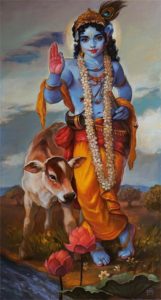Hare Krishna dear devotees,
As we come into the world of ISKCON we may feel we have come into the world of swans , where purity is flowing incessantly and everyone seems destined to make very fast spiritual progress. This is, of course, true to a very large extent. However, as with any large organisation, it is very difficult to check the credential of each and every person and imposters may slip in, a wolf in a sheep’s clothing. As aspiring devotees it is best be cautious and certainly not give our common sense a long vacation and fall into a well by following blindly.
Both blind following and absurd inquiries are condemned.
(BG 4.34p)
In the current contaminated environment it is best to remain alert and if we observe something which is out of normal then we must question it, in a gentle and polite manner, and if we are not satisfied by the reply then we should bring it to the notice of local temple authority. And do not let anyone hide behind a holier than thou curtain. Similarly as we start confiding in others, opening our heart, we must check their credentials via someone whom we can trust and do not blindly assume that just because someone sings very nice bhajans or is at a senior administrative position in temple or a popular preacher then he must be a pure devotee and can be trusted blindly.
Do not do blind following : Blind following means: “Oh, there is a swami. So many thousands of people are following. Let me become his disciple.” This is called blind following…. You do not know. But because everyone is going, “Oh, let me become his disciple.” This is blind following, without any knowledge, blind following.
(SP Lecture, 12th Jan, 1969, Los Angeles)
As one joins the world of ISKCON then one may have many anarthas ( impurities) and not so pure motivation as well. One may join the society for power, women, money, fame, etc. ISKCON is like a desire tree and may even fulfill it. Krishna also says in BG 7.16
catur-vidhä bhajante mäà janäù sukåtino ‘rjuna
ärto jijïäsur arthärthé jïäné ca bharatarñabha
O best among the Bhäratas, four kinds of pious men begin to render devotional service unto Me—the distressed, the desirer of wealth, the inquisitive, and he who is searching for knowledge of the Absolute.
Srila Prabhupada writes in his purport : When these four kinds of persons come to the Supreme Lord for devotional service and are completely purified by the association of a pure devotee, they also become pure devotees. As far as the miscreants are concerned, for them devotional service is very difficult because their lives are selfish, irregular and without spiritual goals.
So some people may join ISKCON for money, power, or any other personal sense gratification but as an iron, put into fire, gradually develops all the characteristics of fire. Similarly even people with impure, but NOT sinful, motivation, start practicing devotional service, associate with pure devotees they then gradually become purified of such impure desires. However clever imposters, who are in fact sinful, may take advantage of such broad mindedness and exploit the simple hearted devotees to fulfill their ulterior and sinful desires. We should be always cautious that we do not fall into the company of these miscreants, hiding in the garb of a devotee.
To obey the imperfect person means just like a blind man following other blind man. So what benefit he will get? If one blind man is begging help from others, “Please help me in crossing the road,” if another blind man comes and he says, “Yes, come on with me,” so what will be the result? Both will be crushed by accident.
(Srila Prabhupada in discussion with Hayagriva dasa)
And we may even come across devotees who may not be imposters but we can see that they are carrying a very heavy burden of anarthas, a strong desire for personal sense gratification. How should we deal with such devotees?
One who approaches the Supreme Lord to render devotional service, but who is proud of his personality, envious of others or vengeful, is in the mode of anger. He thinks that he is the best devotee. Devotional service executed in this way is not pure; it is mixed and is of the lowest grade, tämasaù. Çréla Viçvanätha Cakravarté Öhäkura advises that a Vaiñëava who is not of good character should be avoided. A Vaiñëava is one who has taken the Supreme Personality of Godhead as the ultimate goal of life, but if one is not pure and still has motives, then he is not a Vaiñëava of the first order of good character. One may offer his respects to such a Vaiñëava because he has accepted the Supreme Lord as the ultimate goal of life, but one should not keep company with a Vaiñëava who is in the mode of ignorance.
(SB 3.29.8p)
Such a miscreant is not a vaishanava but a Kali-Cela
In this Age of Kali there are many mundane persons in the dress of Vaiṣṇavas, and Śrīla Bhaktivinoda Ṭhākura has described them as disciples of Kali. He says, kali-celā. He indicates that there is another Vaiṣṇava, a pseudo Vaiṣṇava with tilaka on his nose and kaṇṭhī beads around his neck. Such a pseudo Vaiṣṇava associates with money and women and is jealous of successful Vaiṣṇavas. Although passing for a Vaiṣṇava, his only business is earning money in the dress of a Vaiṣṇava. Bhaktivinoda Ṭhākura therefore says that such a pseudo Vaiṣṇava is not a Vaiṣṇava at all but a disciple of Kali-yuga.
(CC Madhya 1.220p)
Some suggestions
- Do not do follow anyone blindly.
- Keep common sense handy at all times.
- Strictly maintain all basic moral and social protocols under all circumstances.
- Householders should take counseling from successful and senior householder devotees.
- Matajis should strictly avoid meeting male preachers without the presence of any adult male member of the house.
- No phone counseling between matajis and male preachers.
- Matajis should cultivate relationships with senior matajis for personal issues.
- Progress in devotional life together as one family and not enforce our personal standards, howsoever high or right it may seem, on other family members who may not be able to follow it at their present stage. Encourage but do not impose.
- Remain conscious and sensitive for any out of ordinary signs at home. Gently share and discuss your concern with your partner.
- Daily pray to Krishna to protect your family. ( The grahastha ashrama , our home, is an island of sanity, an ashrama, a support system for our spiritual life, compared to the madhouse outside, we should always pray to protect it)
All glories to Sri Guru and Gauranga.
All glories to Srila Prabhupada.
Your servant,
Giriraj dasa


